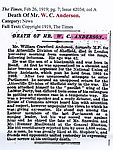Will Anderson joined the Independent Labour Party, and served as its chairman from 1911 to 1914. He failed to be elected as a Labour M.P. on two occasions, but was returned, unopposed for the Attercliffe Division of Sheffield in 1914. A great political career was predicted for him, but his pacifist views lost him the general election at the end of the First World War in 1918.
Mary and he were well matched. They shared a sympathy for the working classes, and a determination to improve conditions. Both were keen workers in the Labour movement, and inspirational public speakers.
William Crawford Anderson came from a little village in Banff, Scotland, where his father was a blacksmith. He attended the village school, where he developed a love for books. At the age of sixteen he was apprenticed to a manufacturing chemist in Aberdeen, but he did not enjoy life in commerce. It was not chemistry that he studied in his spare time, but Latin, Greek and mathematics. He attended evening classes in Aberdeen, and spent many hours in the public library.
From Aberdeen he went to Glasgow, where he was employed in a chemist's shop, serving over the counter. He became an organiser for the National Union of Shop Assistants. It was at this time that Will met Mary. His union work took him to London, where his relationship with Mary continued.
Will left trade union work for a political career. He gave lectures, wrote articles and pamphlets on social problems. The Labour Party recognised his ability and invited him to stand as candidate for the Hyde Division of Cheshire in 1910, and for Keighley Division of Yorkshire in 1911. Will and Mary were newly weds, only recently returned from honeymoon, when Will fought the 1911 election. Mary went through the battle by his side, speaking at many meetings on his behalf. However, Will was unsuccessful on both occasions, succeeding in becoming an M.P. only in 1914. He was chairman of the Labour Party from 1914 to 1915.
A newspaper described Will Anderson as, "Short, thick set, clean shaven, he looks the bulldog type, and in ways he lives the part. He is indefatigable in work and his persistence is notorious. He is deterred by nothing; in a minority of one - himself - he would not be perturbed;.....He is ready to face unpopularity in support of his opinions; he is not affected by success." (The World, 12th February 1918)
Will, like Mary, was a pacifist. In the statement he made at the beginning of the First World War he said,
"We are told that International Socialism is dead, that all our hopes and ideals are wrecked by the fire and pestilence of war. It is not true.
Out of the darkness and the depth we hail our working class comrades of every land. Across the roar of guns, we send sympathy and greeting to the German Socialists. They are no enemies of ours, but faithful friends.
In forcing this appalling crime upon nations, it is the rulers, the diplomats, the militarists who have sealed their doom. In tears and blood and bitterness, the greater Democracy will be born. With steadfast faith we greet the future; our cause is holy and imperishable, and the labour of our hands has not been in vain.
Long live Freedom and Equality! Long live International Socialism!"(www.spartacus.schoolnet.co.uk)
It was Will's pacifism that lost him the election in 1918. He was rejected by over 5,000 votes. All the candidates on the peace platform suffered a similar fate.
Shortly after the election, Will caught influenza. It turned to pneumonia, and he died on 25th February 1919.
Rollover the captions in the box to see the available images in thumbnail format, click the caption to see the full-size image
| Reference: | 706 |
| Keywords: | |
| Archive Ref: | |
| Updated: | Fri 27 Apr 2007 - 0 |
| Interpretation written by | Barbara Harris |
| Author's organisation | |
| Organisation's website |

